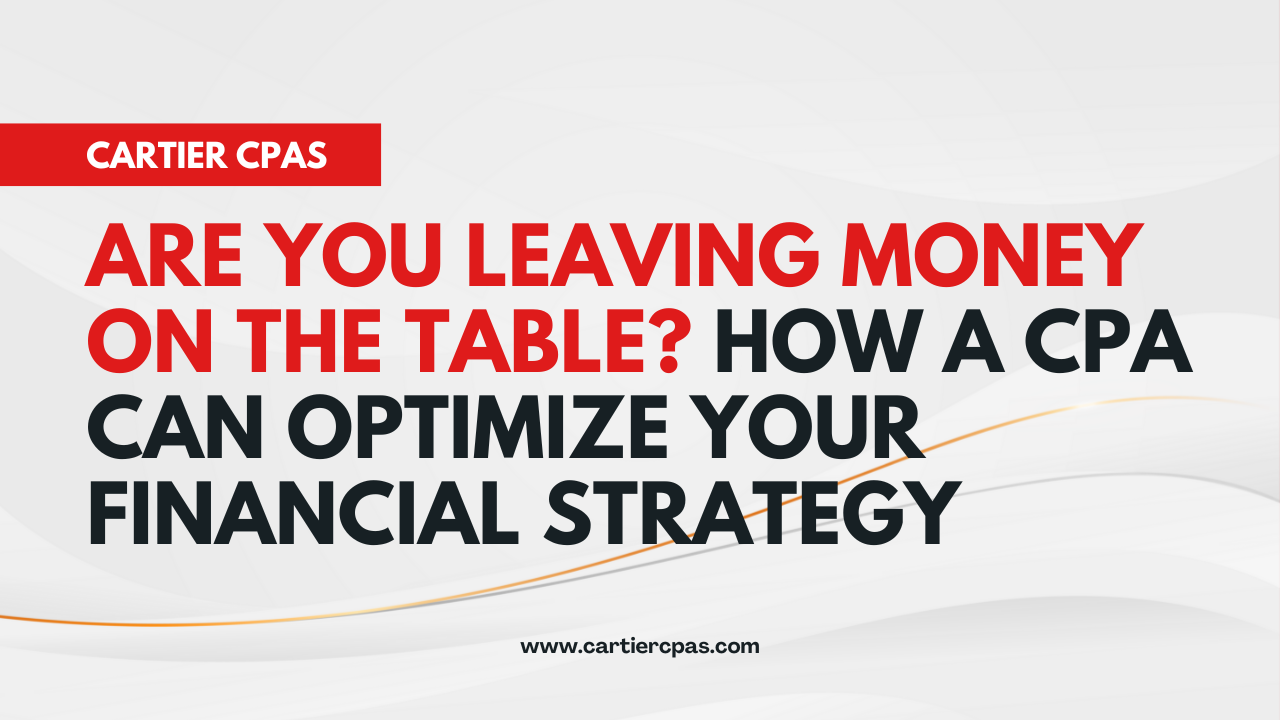The Road to Financial Wellness: How a CPA Can Help You Achieve Your Money Goals

Achieve Financial Wellness with a Certified Public Accountant
What does it mean to be financially well? It goes beyond just having enough money to pay your bills. True financial wellness is having the resources and knowledge to meet your current financial obligations, prepare for future goals, and sleep well at night. That’s where working with a certified public accountant (CPA) can make a big difference.
CPAs are uniquely equipped to provide personalized guidance to help you achieve financial wellness. With expertise in areas like tax planning, investment strategy, retirement preparation, and estate planning, a CPA can be your financial advocate. Read on to learn more about how partnering with a CPA can set you on the road to financial health.
Defining Financial Wellness
Financial wellness involves having financial stability in the present while also being able to save and invest for the future. Key elements of financial wellness include:
- Living within your means - This means spending less than you earn so you aren't accumulating unhealthy debt. Setting a realistic budget and sticking to it is key.
- Having an emergency fund - Experts recommend having 3-6 months of living expenses set aside in case of an emergency like job loss or major home repair.
- Managing debt responsibly - Avoid high interest debt like credit cards. Have a plan to pay off debt like student loans in a reasonable timeframe.
- Saving for goals - Consistently contribute to short and long term savings for things like vacations, vehicles, college, and retirement.
- Having adequate insurance - Make sure you have proper health, disability, auto, home, and life insurance coverage.
- Investing for the future - Invest in things like retirement accounts, mutual funds, and real estate to steadily build wealth over decades.
- Having an estate plan - Create clear plans for how assets will be passed on through wills, trusts, beneficiaries, and asset gifting.
Accomplishing all those tasks allows you to have control over your finances rather than feeling controlled by your finances. Financial wellness leads to less stress and anxiety. Attaining lasting financial wellness should be everyone's goal.
Benefits of Financial Wellness
Reaching a state of financial wellness has many benefits:
- More opportunities - You can seize opportunities to enrich your life, like taking dream vacations, without the limitation of finances holding you back.
- Ability to give - The more financially well you become, the more you can give back to causes important to you through charitable donations and volunteering.
- Security for later years - You don't have to worry about your livelihood as you age or face unexpected health issues. Your savings and insurance provide comfort.
- Passing on a legacy - With proper estate planning, you know that your assets will be left to loved ones or charities according to your values.
- Pride and confidence - There is deep satisfaction in knowing you made smart financial choices leading to stability and abundance.
Financial wellness gives you freedom - freedom from stress about money, freedom to enrich your life, and freedom to leave a lasting legacy.
How a CPA Provides Financial Guidance
Achieving financial wellness rarely happens by accident. It requires carefully planning, discipline, and guidance from financial experts. That's where a certified public accountant can help.
CPAs are financial professionals with specialized expertise in money management, taxes, accounting, and financial planning. When you work with a CPA, you have a financial advocate to maximize your money.
Specifically, a CPA can provide guidance with:
- Budgeting - They can help track your spending, create realistic budgets aligned with your financial goals, and offer tips to save and manage debt.
- Record keeping - CPAs will help you organize tax records, insurance policies, titles, investment statements, and all paperwork needed for optimal financial tracking.
- Tax planning - CPAs are experts at finding deductions, credits, and tax-advantaged accounts to minimize your tax liability.
- Audit support - If you ever face the prospect of an IRS audit, your CPA can represent you and communicate with tax authorities.
- Investing - CPAs help you develop long-term investment strategies tailored specifically for your retirement plans and other financial goals.
- 401(k) and IRA guidance - They can advise you on making the most of workplace retirement accounts and setting up IRAs.
- Insurance planning - They recommend insurance policies to protect your assets without overpaying for unnecessary premiums.
- College savings - CPAs guide you on how much to save, the best college savings vehicles, and ways to pay for college.
- Debt reduction tactics - They create plans to pay off debt quickly by minimizing interest payments.
- Real estate planning - CPAs help with decisions on home ownership like rent vs. buy analysis, purchase timing, and mortgage options.
- Retirement planning - They run projections on your retirement income and savings needs and suggest ways to close any gaps.
- Estate planning - CPAs help you create wills, designate beneficiaries, set up trusts, and develop estate tax strategies.
The expertise of a CPA covers every aspect of your financial life. Their guidance maximizes your money in the short and long term.
Tax Planning Benefits
One of the biggest values a CPA provides is expertise in developing proactive tax planning strategies. CPAs stay continually updated on the intricacies of the tax code to identify how clients can minimize their tax burden through deductions, credits, income shifting, and more.
Some of the strategies a CPA may employ for tax reduction include:
- Maximizing 401(k) contributions - Contributing to traditional 401(k)s lowers your taxable income. CPAs advise on maxing out annual contributions.
- Health savings accounts - Money contributed to an HSA reduces your taxable income. CPAs help set up and fund these accounts.
- Harvesting tax losses - Selling losing investments can offset capital gains and lower your tax burden. CPAs guide you on loss harvesting.
- Donating to charity - If you itemize your deductions, charitable giving helps lower taxable income. CPAs explain deduction limits.
- Claiming business expenses - If you are self-employed, your CPA identifies deductible business expenses like mileage, supplies, home offices, and more.
- Education credits and deductions - CPAs uncover tax savings opportunities related to education costs through vehicles like 529 plans.
- Child and dependent credits - Raising kids and supporting others can make you eligible for tax credits. Your CPA will ensure you claim everything entitled.
- Splitting income - If married, CPAs may recommend ways to shift income between spouses to take advantage of lower tax brackets.
- Roth IRA conversions - Converting traditional IRA funds to a Roth IRA can reduce lifetime tax liability. A CPA analyzes if this makes sense.
- Catching errors - CPAs double check your returns to correct any mistakes and prevent audits and penalties.
Proactive planning with an experienced CPA can result in thousands of tax savings over your lifetime.
Investment Planning Approaches
One of the keys to building lasting wealth is developing a sound investment strategy. Your CPA can guide you on making investments that align with your risk tolerance and time horizon.
Factors a CPA considers when advising on investments include:
- Risk tolerance - They help you complete questionnaires to determine your comfort level with risk so investments stay within your bounds. Conservative investors may favor things like bonds and dividend stocks, while more aggressive investors may opt for emerging market funds and small cap stocks.
- Time horizon - If you are investing for retirement 30 years away, you can accept more risk and volatility. Your CPA steers you toward long-term capital appreciation. If you need funds in 5 years for college, CPAs recommend safer investments like high yield savings.
- Asset allocation - CPAs run analysis to arrive at investment allocations across stocks, bonds, real estate, commodities, and cash that align with your risk appetite and objectives. Diversification is key.
- Fees - CPAs recommend low fee investments like certain ETFs and index funds when appropriate so more of your money goes to growth rather than management expenses.
- Tax strategy - Taxable accounts are invested differently than retirement accounts to minimize Uncle Sam's cut. CPAs construct your portfolio using tax-efficient placements.
- Rebalancing - As some investments outperform, asset allocation can shift out of balance. Your CPA helps rebalance periodically to maintain target allocations.
- Performance - Your CPA monitors your investment returns versus appropriate benchmarks and suggests changes if you are lagging.
With guidance from a CPA, you can invest confidently knowing your portfolio is structured to meet your needs.
Retirement Planning with a CPA
One of the biggest financial goals most people have is being able to retire comfortably. A CPA can help make sure you are on track to have enough income in your later years.
Retirement planning starts with estimating your income needs in retirement based on the lifestyle you envision. Will you travel extensively? Will your mortgage be paid off? What standard of living do you hope to maintain? Your CPA runs projections to quantify your target annual retirement income.
Next, your CPA reviews all your current retirement savings in accounts like 401(k)s, IRAs, annuities, and pensions. They project how much those existing balances may grow to by retirement based on expected returns.
Comparing your income needs to your projected savings gives a clear picture of any potential shortfall. Your CPA may recommend increasing your savings rate if a gap exists. For example, they may advise contributing 15% of your salary rather than just 10%.
As you enter retirement, CPAs recommend strategies for withdrawing from accounts in a tax efficient manner. They also analyze which accounts to tap first to optimize for tax treatment, required minimum distributions, and more.
CPAs also consider sources of guaranteed lifetime income like social security and annuities. They run alternate scenarios changing factors like your claiming age to maximize total income.
Detailed retirement planning with a CPA reduces chances of outliving your savings and creates confidence in your financial future.
Estate Planning with a CPA
CPAs can also assist with estate planning to ensure your assets are passed on according to your wishes when you pass away. Estate planning often involves strategies to also minimize taxes owed by your heirs.
As part of the estate planning process, your CPA helps:
- Create a clear will stating beneficiaries and asset distribution details to avoid disputes between heirs. CPAs ensure wills adhere to your precise desires.
- Set up trusts as needed, like an irrevocable life insurance trust to keep life insurance proceeds out of your taxable estate. Trusts provide more control than direct asset gifting.
- Designate proper beneficiaries for all your accounts so assets transfer directly rather than through probate. CPAs help select primary and contingent beneficiaries.
- Gift assets before death, like to grandchildren, to reduce the size of your taxable estate if it exceeds estate tax exemption levels. CPAs guide you on gift tax nuances.
- Establish plans for business interests, real estate properties, personal possessions, digital assets, and all your property to avoid confusion. Your CPA covers all your assets.
- Navigate probate after your passing and communicate with the executor to close out your affairs according to your documented wishes.
- Develop strategies to minimize estate taxes owed on assets transferred. CPAs run scenarios to reduce your taxable estate.
Proper planning ensures you leave the legacy you desire. A CPA helps you protect your life's work.
Selecting a CPA for Your Needs
With money management guidance across all those areas, working with a CPA provides immense value. As you search for a CPA, keep the following tips in mind:
- Ask for referrals from trusted business contacts and financial advisors
- Look for CPAs with additional certifications like PFS (Personal Financial Specialist) or CFP (Certified Financial Planner)
- Choose a CPA that specializes in services relevant to you, like taxes or retirement planning
- Select a CPA that has experience working with individuals with situations similar to yours
- Meet with the CPA beforehand to confirm you have a good rapport and align on planning philosophies
- Review credentials to ensure an ethical track record and no disciplinary issues
Schedule introductory meetings with a few qualified CPAs in your area to find the best fit.
Partner for Financial Wellness
Achieving lasting financial wellness involves diligently managing your day-to-day finances while keeping an eye on the future. With so many complex money decisions to make, guidance from a knowledgeable CPA provides immense value.
By leveraging the tax, investing, retirement, and estate planning expertise of a CPA, you put yourself firmly on the road to financial wellness. Contact CartierCPAs today to schedule a consultation and let us help guide you towards financial freedom!
Contact us today, at Cartier CPA's our goal is to provide clients with the highest level of respect and quality of service.










